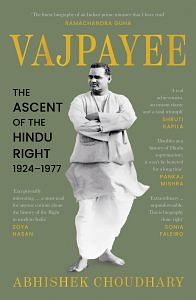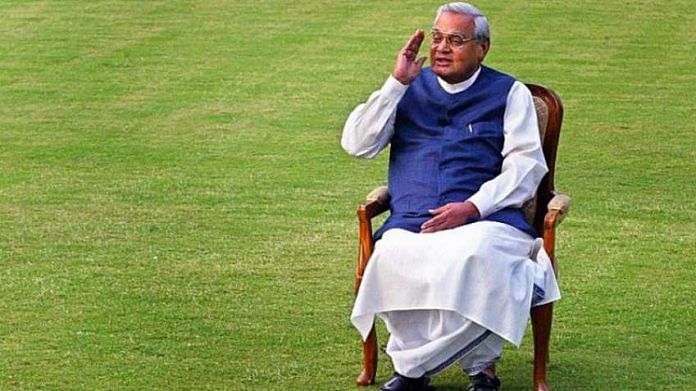Atal would share editorial responsibilities with Rajiv Lochan Agnihotri, an RSS pracharak from Rewa state. The monthly issues were to follow the Hindu calendar: the first one was slated to come out on 31 August 1947, coinciding with the Rakhi festival. It was decided to print 3,000 copies. Given that the average circulation of a popular Hindi journal around the time was no more than 500, this was an ambitious number – hinting at the magazine’s ample financial backing. A local volunteer called Radheshyam Kapoor was made the publisher. The money came from the Sangh networks, some of it siphoned off from the funds the RSS had collected for the welfare of displaced refugees. To avoid legal traps, however, Rashtradharma was not registered in the name of Bhaurao or Deendayal. The mouthpiece would not mention any association with the RSS at all.
The first issue had Atal’s imprint all over it. The magazine opened with his celebrated ‘Hindu Tan Mann’. Atal was not keen ‘to put [his] poem on the first page. But Bhauraoji kept insisting, so I agreed.’ Contributions were either made in-house – Atal, Deendayal and Rajiv contributed an essay each – or gathered from the massive pool of the RSS’s prominent workers and sympathizers.* The striking feature of the first issue was its romanticization of cultural revival and lack of concern with the specific problems of the day. Most articles either highlighted the glory of ancient India or presented historical fiction based on Hindu scriptures. Atal’s essay, which he had been working on since Kanpur, was published as ‘Muslim Rajya: Beej, Vikas aur Fal’ – Muslim State: Seed Growth and Fruit. At nineteen pages and more than 8,000 words, it was an angry, passionate, elliptical, rambling piece of polemic attempting an overarching summary of the long history of Islam in India.
‘The seeds of this poisonous tree [partition] were sown not in 1940’ when the League first passed a resolution demanding a separate homeland for Indian Muslims, ‘not even 150–200 years ago’ when the British ensconced themselves in India through trade, deceit and support from local elites, ‘rather many, many centuries ago, with meticulous planning
and a definite objective that had now at last come to fruition’. Islam’s mission had never been ‘to trade and exploit the society economically. Nor did they intend to settle their rapidly increasing population here. They had only one motto: kill the infidels, spread Islam.’
Just as ‘we’ in his poems implied a homogeneous community of Hindus, ‘they’ referred to a global network of Islam at the turn of the first millennium. While historical accounts lean towards the economic rather than the religious motives for the frequent attacks from the north-west, nearly all agree that the Afghans, Turks and Persians were also frequently at each other’s throats. At a time when Hindus–Sikhs were killing and, in turn, getting killed by Muslims, this narrative brought a certain urgency. Centuries-old events were inspiring many – some of them from the RSS, not unlike Atal – to kill and, if need be, die to save India for the Hindus.
The essay moved swiftly to the seventeenth century, when the British arrived, with Atal arguing that the ‘Muslim Sultanate’ was gasping for its last breath as the Marathas had wrested power back from the Mughals. After the soldiers’ mutiny in 1857, the British began to realize that to rule India the best strategy was to have an Anglo-Muslim axis that could be used to counter the Hindus. As the Muslims ‘shed tears at Bahadur Shah’s grave, they pledged to awaken political consciousness … to once again establish the rule of Muslims in Hindustan’. Atal charged Muslim politicians and intellectuals with steering the Muslim masses towards separatism: ‘Only two years after the Congress was founded, on 20 December 1887, Syed Ahmed Khan made a historic speech in Lucknow supporting a policy of separatism and exhorting Muslims to boycott Congress.’ Similarly, the essay marshalled poems from Allama Iqbal’s popular 1909 collection of Urdu verses, Shikwa (Lament), extolling the glories of the past, lamenting to Allah the downgraded fortunes of
Muslims, stoking a desire for an exclusive new homeland.
In the early twentieth century, the British ‘asked the Hindus and Muslims to first unite before they would give us any reforms’. But it was only the Hindus who ‘kept chasing the mirage of Hindu-Muslim unity, and always lost in our quest. The British kept the Muslims in good humour by giving them a large chunk of benefits. We the Hindus kept looking to them with expectant eyes, and whenever we got a piece or a half, satisfied ourselves and made shrieks of sacrifice … In the beginning Congress at least nominally opposed the separate electorates in the name of unity and nationalism, but accepted it in 1916.’ This sentence had a clever evasion. Atal did not name Tilak, but he was tangentially blaming the mentor of the Mahasabha–RSS founders for having facilitated the partition. The Congress was cowardly and devoid of political instincts, a party supposedly representing Hindus, but one that failed to understand the designs of the Anglo-Muslim axis. A tiny group of cruel and shrewd British men running India were keen to use all available tools – suppression, constitutional reforms, diplomacy – to prolong their empire.
Atal now came to the man whom everyone in the RSS and the Mahasabha detested: Mahatma Gandhi. They thought Gandhi useful as a moralist and spiritualist, but essentially devoid of political instincts. World War I (1914–18) had, Atal wrote, ‘fuelled the Pan-Islamist ambitions of Indian Muslims. Around this time, Gandhiji, along with the Ali brothers, frequently invited the Afghans to invade India. But fortunately the Gandhi-Muslim conspiracy got noticed, and thus 30 years ago that disgusting attempt to convert India into Pakistan was thwarted.’
This was in fact the oldest RSS–Mahasabha charge against Gandhi, made famous by elders such as B. S. Moonje repeating it ad nauseam over the decades. Some background here is necessary: During May–June 1919, the Afghans and the British had fought a bloody war ending in 2,000 casualties, both Afghan and British-Indian, before a peace treaty was signed. Towards the end of 1919, Gandhi had also begun mobilizing support from Hindus and Muslims for the joint Khilafat and NonCooperation movements. In a Young India article on 4 May 1921, Gandhi wrote he would ‘in a sense, certainly assist the Amir of Afghanistan, if he waged war against the British Government. That is to say, I would openly tell my countrymen that it would be a crime to help a Government which had lost the confidence of a nation to remain in power.’ In the same article Gandhi clarified what he meant: that the British government often used geopolitics and ‘the Afghan bogey’ to deny independence to India, and thus ‘kept us under the perpetual fear of our neighbours and the whole world, and drained India of her splendid resources, so that she has lost faith in herself either for defence or for dealing with the simple problem of the growing poverty’.
 Excerpted with permission of Pan Macmillan India from Vajpayee: The Ascent of the Hindu Right 1924-1977 by Abhishek Choudhary.
Excerpted with permission of Pan Macmillan India from Vajpayee: The Ascent of the Hindu Right 1924-1977 by Abhishek Choudhary.



